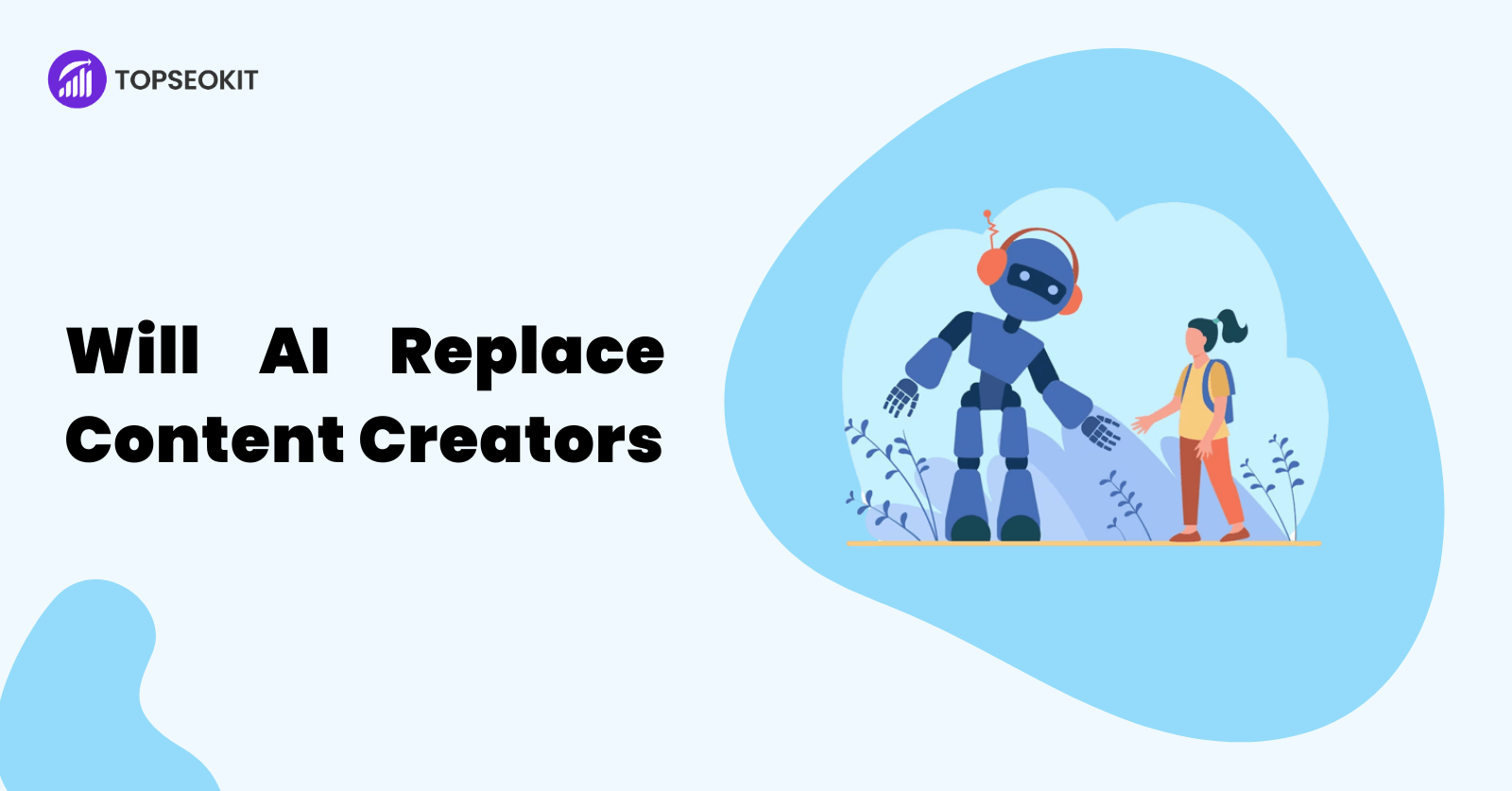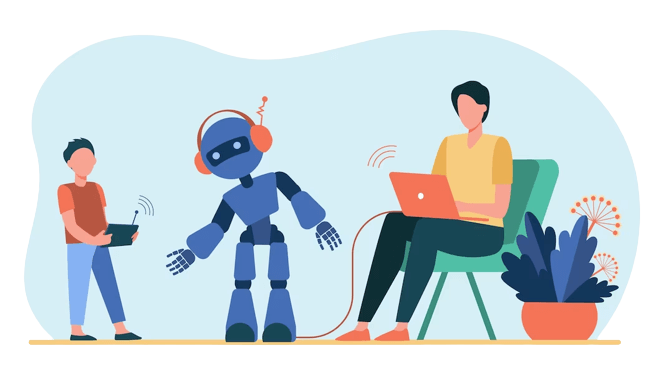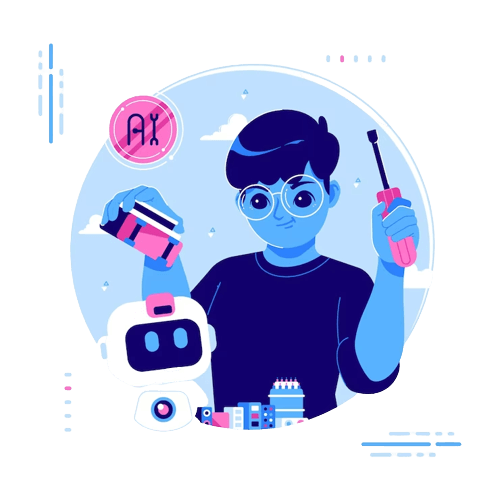
Will AI replace Content creators? Specialists share their opinions
Amidst the technological revolution, the question ‘Will AI replace content creators?’ has sparked intense debate among specialists. While some argue that AI’s efficiency and precision could overshadow human creativity, others believe that the unique human touch in content creation is irreplaceable
Table of Contents
- AI and Content Creators- A new era of Collaboration
- The role of AI in Content Creation
- Perspectives from Content Creation Specialists
- Casestudies: AI in Content Creation
- Future Outlook
- Conclusion
- FAQs
In the realm of content creation, AI is making significant strides. It’s not just about spell-checking or grammar correction anymore. AI can generate articles, write blog posts, and even create poetry. But does this mean that AI will replace content creators? Let’s delve deeper into this question.
1. AI and Content Creators – A New Era of Collaboration
Imagine yourself in a world where machines can write, create, and even innovate. It is not a scene from a science fiction movie but the reality of today’s digital landscape.
Artificial Intelligence (AI), a technology that simulates human intelligence processes, is increasingly becoming a part of various industries. From healthcare to finance, AI is transforming how we work, live, and create.
2. The Role of AI in Content Creation

The Bright Side: Advantages of AI-Generated Content
AI-generated content comes with a host of advantages. For starters, it can produce content at a speed that no human can match. Imagine having to write a hundred articles in a day; Sounds impossible. But for AI, it’s a walk in the park.
Moreover, AI can analyze vast amounts of data and extract valuable insights. For instance, it can identify trending topics, analyze user behavior, and predict what content will resonate with the audience. It can be a game-changer for content marketing strategies.
Let’s take the example of a news agency. They can use AI to quickly generate news reports based on data feeds, freeing their human journalists to focus on in-depth investigative reporting. This way, AI can complement human creativity, not replace it.
The Other Side: Limitations and Challenges of AI-Generated Content
However, AI-generated content has its limitations. While AI can mimic human writing, it lacks the emotional depth and personal touch that human writers bring to their work. AI can’t feel joy, sadness, or excitement; these emotions often form the crux of compelling storytelling.
Furthermore, AI operates based on algorithms and data. It can only think outside the box and come up with innovative ideas. For example, suppose you ask an AI to write a story about a unicorn in a spaceship. In that case, it might struggle because it has yet to be fed data about such a scenario.
While AI is revolutionizing content creation with its speed and data analysis capabilities, it is unlikely to replace human content creators. The creativity, emotional depth, and innovative thinking humans bring to content creation are irreplaceable. In its current state, AI is a tool that can aid content creators, not replace them.
3. Perspectives from Content Creation Specialists: A Spectrum of Opinions

An Optimistic View: AI and Content Creators in Harmony
Let’s start with the perspective of John Doe, a renowned content strategist, and AI enthusiast. John sees AI as a powerful tool that can enhance the work of content creators. “AI can handle the heavy lifting of data analysis and content generation, freeing up creators to focus on strategic and creative tasks,” he says.
John also envisions a future where AI and content creators work in tandem. “Think of AI as a co-writer, not a replacement. It can provide suggestions, generate drafts, and even edit content. But the final touch, the creative spark, is where humans come in,” he explains.
A Skeptical View: The Irreplaceable Human Touch
On the other end of the spectrum, we have Jane Smith, a seasoned writer, and editor skeptical about AI replacing content creators. Jane believes that content creation is an inherently human task. “Writing is not just about stringing words together. It’s about empathy, understanding, and connection. These are qualities that AI, in its current state, cannot replicate,” she argues.
Jane also points out the limitations of AI in creative tasks. “AI can write a news report or a product description, but can it write a heartfelt letter or a gripping novel? I don’t think so,” she says.
A Balanced Perspective: The Best of Both Worlds
Finally, we have Alex Brown, a digital marketing expert with a balanced perspective on AI and content creators. Alex sees AI and content creators as complementary forces. “AI can provide the data and the speed, while humans provide the creativity and the emotional depth. It’s not a competition, but a collaboration,” he suggests.
Alex also raises an important point about ethical considerations in AI-generated content. “We need to ensure that AI is used responsibly. Transparency is key. If a piece of content is AI-generated, it should be clearly stated. This way, he concludes that we can maintain trust and authenticity in the digital content landscape,” he concludes.
In the end, the role of AI in content creation is a complex issue with diverse perspectives. Whether you’re an optimist like John, a skeptic like Jane, or somewhere in between like Alex, one thing is certain: the conversation about AI and content creators is far from over.
4. Case Studies: AI in Action in Content Creation
AI-Powered Content Curation Platforms: A New Wave of Efficiency
Let’s take a look at how AI is reshaping content curation. Platforms like DrumUp and Curata leverage AI to streamline content curation. These platforms use AI algorithms to scan the web for relevant content based on predefined criteria. They then present a curated list of content to the user, saving them hours of manual searching.
For content creators, this is a game-changer. Instead of spending hours scouring the web for inspiration or relevant content, they can now focus on creating original content. It is a perfect example of how AI can enhance the work of content creators, not replace them.
AI in Copywriting and Content Generation: The Future of Marketing?
Next, let’s explore the role of AI in copywriting and content generation. Tools like Articoolo and WordAI are using AI to generate written content. You input a topic, and the tool generates a unique article or blog post in seconds.
But how does this impact marketing strategies? Well, imagine generating personalized marketing copy for each of your customers in real-time and producing a high volume of content for your SEO strategy without straining your content team. These are just a few ways AI-generated content can revolutionize marketing.
However, it’s important to remember that AI-generated content should be used responsibly. As our expert Alex Brown pointed out, transparency is critical. If a piece of content is AI-generated, it should be clearly stated. This way, we can maintain trust and authenticity in digital content.
Future Outlook: AI and Content Creation – A Dynamic Duo
Potential Advancements in AI Technology
As you navigate the world of content creation, keeping an eye on the horizon is essential. AI technology is advancing at a rapid pace.
In the future, we might see AI that can generate content and understand and replicate human emotions. Imagine an AI that can write a heartfelt letter or a gripping novel. Sounds far-fetched? Maybe, but in the world of AI, nothing is impossible.
Evolving Roles of Content Creators
With these advancements, the role of content creators is bound to evolve. Instead of writers or designers, content creators might become AI trainers, teaching AI how to create content that resonates with humans.
They might also become AI managers, overseeing the work of AI and ensuring that it aligns with the brand’s voice and values.
Recommendations for Content Creators
So, how can you adapt to these advancements as a content creator? First, embrace AI. Learn about it, experiment with it, and see how it can enhance your work.
Second, focus on developing skills AI can’t replicate, like creativity, empathy, and critical thinking. Finally, stay updated. The world of AI is constantly changing, and the more you know, the better prepared you’ll be.
6. Conclusion
Throughout this exploration of AI and content creation, we’ve delved into the perspectives of specialists, examined case studies, and pondered the future of this dynamic duo.
We’ve seen a spectrum of opinions, from the optimist who embraces AI as a powerful tool to the skeptic who cherishes the irreplaceable human touch and the balanced observer who envisions a complementary relationship.
As you continue your journey in content creation, remember that AI is not a rival but a partner. Embrace its potential, and hone your uniquely human skills. You and AI can create a harmonious symphony of innovation together. The future of content creation is bright, and it’s up to you to seize the opportunities ahead.
7. FAQs:
Will AI replace content creators?
AI is likely to replace content creators partially. However, it may change the nature of their work, with a greater emphasis on curating and refining AI-generated content.
How will AI affect content creators?
AI will likely serve as a tool for content creators, enhancing their productivity and allowing them to generate more diverse content. However, it may also introduce new challenges, such as managing and refining AI-generated content.
Can AI replace creative writers?
While AI can generate text and mimic certain aspects of creative writing, it lacks the human touch, emotional depth, and unique perspectives that human writers bring. Therefore, AI will only partially replace creative writers.
Will AI replace copywriters and content writers?
AI can assist copywriters and content writers by automating specific tasks. However, human writers’ nuanced understanding of language, context, and audience is complex for AI to replicate. Thus, AI is likely to replace these roles partially.
Let’s dive in! Get started for free
